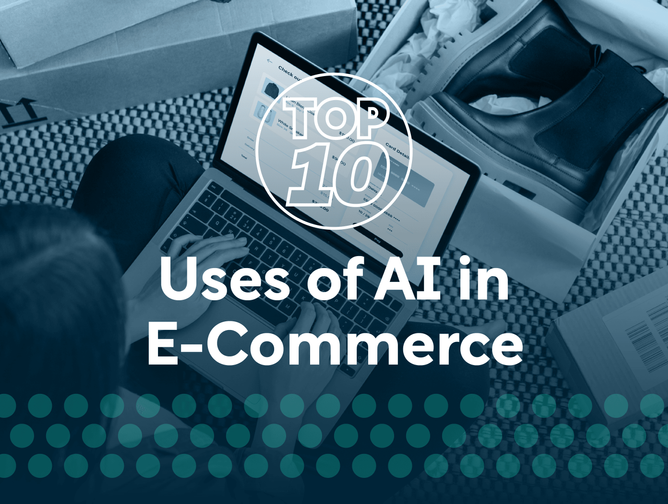
Considering some of the most prominent applications of AI in e-commerce, AI Magazine examines how the technology enhances automation and customized consumer experiences.
The applications of AI in e-commerce are only going to grow.
A growing number of companies are utilizing technology because it allows them to provide individualized customer experiences (CX), automate procedures, and make data-driven choices. AI can help e-commerce companies learn and detect new purchasing trends or behaviors by using data to recommend products to customers.
Because of generative AI, or Gen AI, today’s consumers have higher expectations than ever before, which forces businesses to take preventative measures. In light of this, AI Magazine examines some of the most prominent applications of AI in e-commerce.
10. Tailored product suggestions
Businesses can learn about the tastes and behavior of their customers by using personalized product recommendations. They can accomplish this, among other things, by putting recommendation algorithms into practice, customizing user interfaces, and employing data analysis and machine learning methodologies.
Customers are eager to use AI-powered products, therefore personalized recommendations are happening more often. Retailers may now leverage social media data and consumer reviews and ratings along with AI to enhance the overall shopping experience.
9. Online purchasing assistance
Virtual assistants are changing how consumers make purchases on a regular basis, which presents e-commerce businesses with innovative opportunities. This kind of technology is becoming more and more common as virtual shopping assistants use artificial intelligence (AI) to simulate human speech and assist with client inquiries.
AI assistants, as opposed to chatbots, have the ability to utilize natural language processing (NLP) to adjust their recommendations based on the user’s speech. They can therefore contribute to increased client involvement, time and cost savings for the business, and a smoother online buying experience.
8. Variable costing
The process of altering a product or service’s price to account for shifting market conditions is known as dynamic pricing. By using AI in this way, businesses may optimize their profit margins, draw in new clients from inside their target market, and conduct more data-driven decision-making and market research.
In order to determine prices and increase customer satisfaction, AI algorithms can analyze market demand, competition, and consumer behavior.
7. Fraud detection
In this age of disinformation, businesses are looking more and more to use AI to combat fraud. The technology analyzes vast amounts of data and interprets user behavior to proactively uncover potential fraud.
AI can detect fraud threats by analyzing purchase history, transaction size, and frequency. More generally, AI can expedite the creation and testing of new detection models and help businesses identify early symptoms of fraud.
6. More intelligent search (CV, NLP, visual search)
By comprehending the context of a user’s search query, AI-powered search engines can assist in providing more accurate search results. For example, the technology can assist in giving user personalized search results based on their preferences in real-time, giving organizations more intelligent insights.
Artificial intelligence (AI)-powered search within e-commerce platforms may comprehend natural language queries and direct customers to products that are more relevant to them. Companies can then utilize this information to raise customer satisfaction levels.
5. Promotional selling
AI can be used to improve e-commerce upselling tactics by utilizing data analysis and machine learning algorithms. With the use of AI techniques, comprehensive consumer profiles and segmentation may be created by analyzing data about past purchases, browsing habits, and preferences.
These insights enable AI-powered recommendation engines to provide highly tailored and pertinent upsell recommendations in real time during the buying process, hence raising the average order value and improving the possibility of successful upsells.
4. Inventory control
E-commerce businesses can improve customer happiness and expedite operations by using effective inventory management strategies by utilizing artificial intelligence.
To effectively estimate demand, machine learning algorithms can analyze past sales data, customer behavior patterns, and market trends. Optimized inventory levels are made possible, which lowers stockouts and overstocking. Reordering procedures can be automated by AI, guaranteeing prompt replenishment based on real-time data. Furthermore, slow-moving items can be identified by AI-powered predictive analytics, allowing firms to plan clearance offers or phase out unproductive products.
3. Better ability to predict demand
Artificial intelligence (AI) may produce more accurate forecasts by analyzing past sales data, customer behavior, and industry trends. This gives e-commerce companies a competitive edge.
The utilization of data-driven methodology reduces the likelihood of overstocking or stockouts by enabling precise forecasts of future demand. Furthermore, AI can continuously learn from and adjust to shifting market conditions, guaranteeing that projections are accurate and relevant. Businesses may make more informed decisions, cut expenses related to excess inventory, and improve customer satisfaction by offering greater product availability using AI-powered demand forecasting.
2. Cutting back on manual labor
AI can assist in streamlining and increasing productivity in e-commerce workflows by automating manual tasks. Similarly, companies can reduce their need for labor and thereby optimize their processes.
Despite popular concerns about AI taking the place of human labor, ethical businesses stand to gain greatly from using AI to support rather than replace their workforce. Organizations can lower downtime and improve the efficiency of their operations by doing this.
Similarly, putting automation into practice can help to promote better decision-making.
AI chatbots are quickly growing in importance as an e-commerce tool since they enable companies to communicate with clients in a variety of ways. For example, they can assist in providing round-the-clock customer service, which increases customer support and lessens the workload for human workers.
Similarly, chatbots can assist clients in choosing products and provide answers to any queries they may have regarding a certain good or service. They can even provide customized advice, allowing them to provide each consumer with individualized support.

